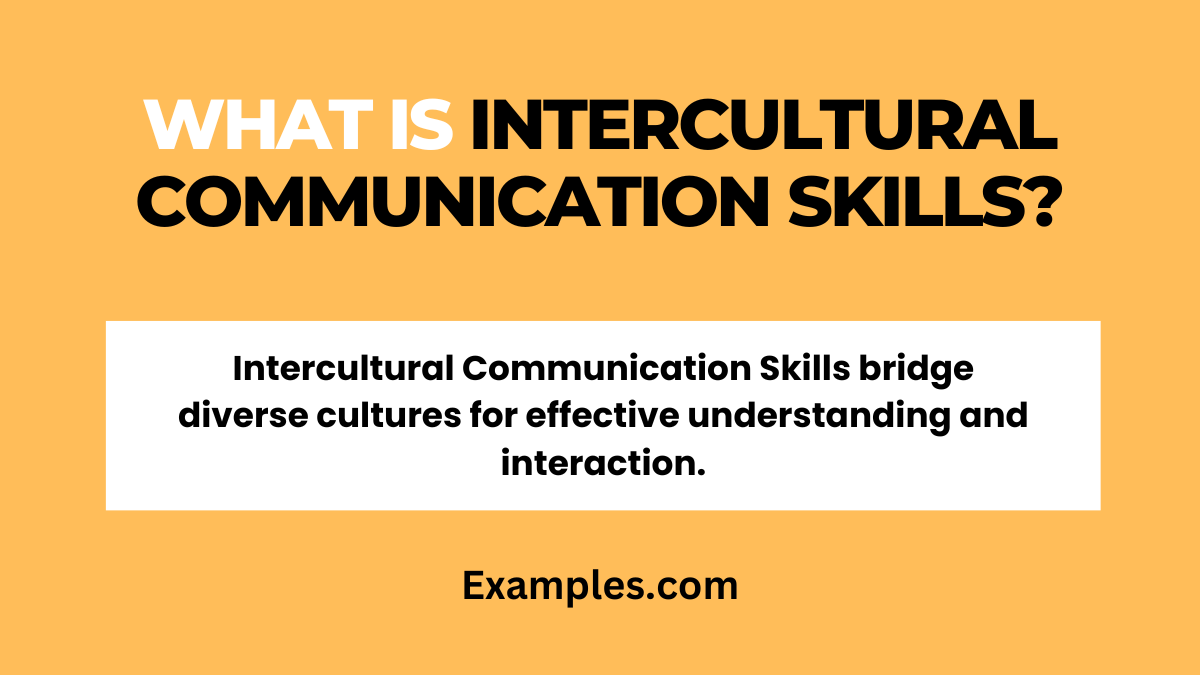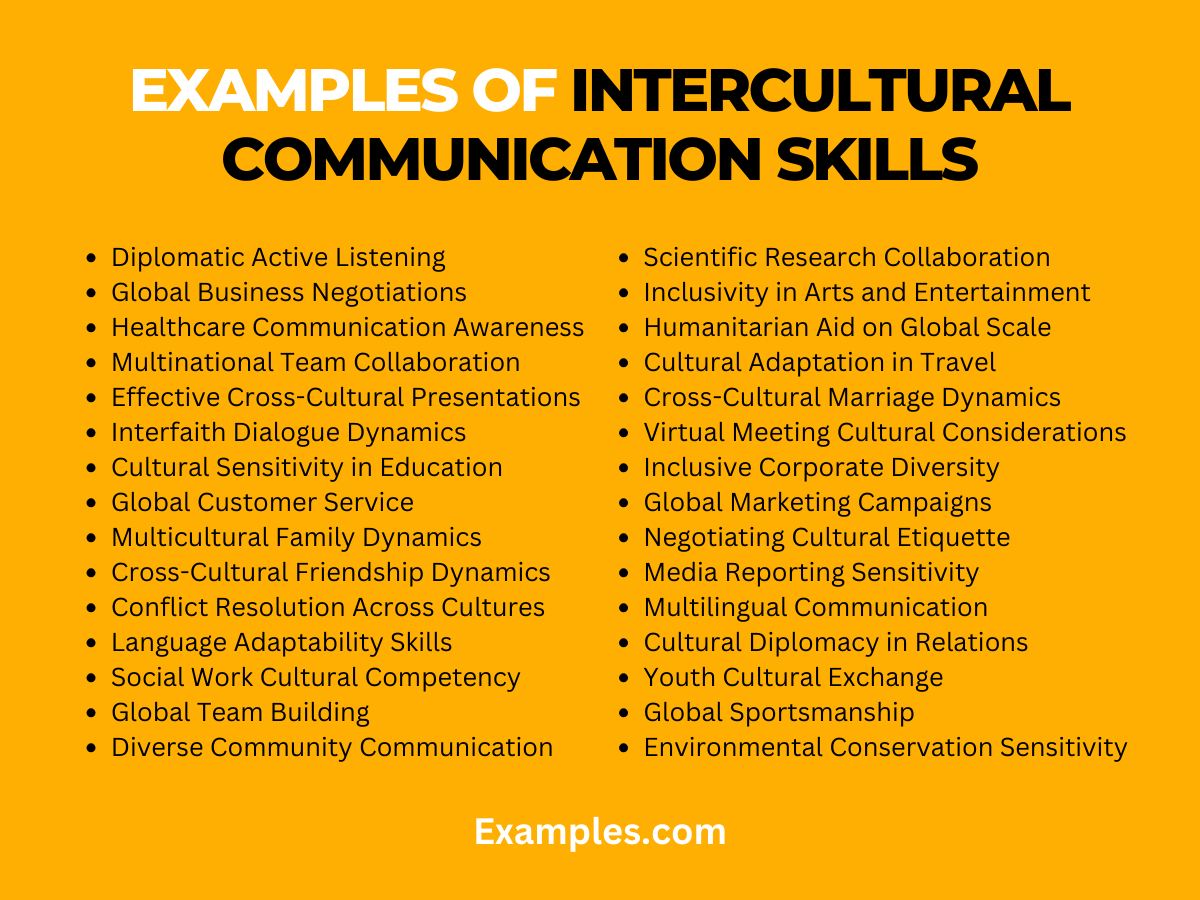29+ Intercultural Communication Skills Examples
Embark on a comprehensive journey to master Intercultural Communication Skills, delving into our detailed guide enriched with vivid Communication Examples. Explore actionable tips and proven strategies to navigate diverse cultural landscapes seamlessly. This guide goes beyond theory, offering practical insights to enhance your cross-cultural communication prowess, fostering connections that transcend borders. Elevate your skill set and embrace the art of effective communication in a globalized world, where understanding different cultures is key to success.
What is Intercultural Communication Skills?

Intercultural Communication Skills refer to the ability to effectively and sensitively convey messages, ideas, and information between individuals from different cultural backgrounds. It involves understanding, interpreting, and adapting communication styles to bridge cultural gaps, fostering mutual understanding and successful interactions. These skills encompass verbal and nonverbal communication, empathy, and cultural awareness, empowering individuals to navigate diverse cultural contexts with respect and proficiency. In essence, possessing Intercultural Communication Skills is essential for building connections and thriving in our interconnected global community.
What is the best example of Intercultural Communication Skills?

In the bustling realm of global business, one exemplary instance of Intercultural Communication Skills shines through in the collaboration between a Japanese and American company on a joint project. Amidst varying cultural norms and business etiquettes, the teams seamlessly navigate challenges by employing effective communication strategies. This involves not only linguistic adaptability but also a profound understanding of each other’s cultural nuances. Through respectful dialogue, compromise, and a shared commitment to the project’s success, this example vividly illustrates how Intercultural Communication Skills can foster cooperation, innovation, and mutual respect on an international stage.
30 Examples of Intercultural Communication Skills

- Active Listening in Diplomacy: Diplomats employing active listening to understand diverse viewpoints in negotiations.
- Cross-Cultural Business Negotiations: Business leaders demonstrating adaptability in negotiations with international partners.
- Cultural Awareness in Healthcare Communication: Healthcare professionals navigating diverse cultural beliefs with sensitivity.
- Multinational Team Collaboration: Team members showcasing flexibility and understanding in a global project.
- Effective Cross-Cultural Presentations: Presenters adapting communication styles for diverse audiences.
- Interfaith Dialogues: Individuals fostering dialogue and understanding across different religious beliefs.
- Cultural Sensitivity in Education: Educators incorporating diverse perspectives in the classroom.
- International Customer Service: Customer service representatives adapting communication to meet global customer needs.
- Multicultural Family Dynamics: Family members embracing diverse cultural backgrounds within a household.
- Cross-Cultural Friendship Dynamics: Friends navigating and celebrating cultural differences.
- Intercultural Conflict Resolution: Resolving conflicts by considering cultural nuances and communication styles.
- Language Adaptability: Individuals proficiently switching between languages in diverse settings.
- Cultural Competency in Social Work: Social workers addressing diverse cultural needs with empathy.
- Global Team Building Exercises: Teams fostering cohesion through culturally inclusive activities.
- Interpersonal Communication in Multicultural Communities: Residents fostering understanding in diverse neighborhoods.
- Cross-Cultural Collaboration in Scientific Research: Researchers working seamlessly across borders.
- Cultural Inclusivity in Arts and Entertainment: Artists creating content that resonates with global audiences.
- International Humanitarian Aid: Aid workers adapting communication to provide culturally sensitive assistance.
- Cultural Adaptation in Travel: Travelers respecting and adapting to local customs.
- Cross-Cultural Marriage Dynamics: Couples navigating cultural differences within their relationship.
- Cultural Considerations in Virtual Meetings: Professionals adapting communication styles in virtual collaborations.
- Inclusive Corporate Diversity Programs: Companies promoting cultural inclusivity in the workplace.
- Cross-Cultural Marketing Campaigns: Marketers crafting messages that resonate across diverse consumer bases.
- Negotiating Cultural Etiquette: Individuals respecting and following cultural norms during social interactions.
- Cultural Awareness in Media Reporting: Journalists providing balanced perspectives with cultural sensitivity.
- Effective Communication in Multilingual Communities: Community leaders bridging language gaps to communicate effectively.
- Cultural Diplomacy in International Relations: Promoting understanding between nations through cultural exchange.
- Youth Cultural Exchange Programs: Young individuals building friendships across cultural boundaries.
- International Sportsmanship and Fair Play: Athletes demonstrating respect for diverse opponents.
- Cultural Sensitivity in Environmental Conservation: Conservationists considering cultural perspectives in global efforts.
Importance of Intercultural Communication Skills?
- Global Collaboration in Crisis Response:
- Enables seamless cooperation among diverse teams in crisis scenarios.
- Ensures a swift and coordinated response to crises that transcend geographical boundaries.
- Cultural Sensitivity in Crisis Management:
- Navigates sensitive cultural aspects in crisis scenarios.
- Prevents inadvertent harm and ensures crisis responses respect diverse perspectives.
- Building Trust in Cross-Cultural Communities:
- Fosters understanding, empathy, and clear communication during crises.
- Critical for garnering support and cooperation within diverse communities.
- Effective Communication with Global Stakeholders:
- Tailors messages to resonate with diverse audiences in crisis situations.
- Mitigates misunderstandings and facilitates informed decision-making.
- Avoiding Miscommunication and Conflict:
- Reduces the risk of misunderstandings, misinterpretations, and conflicts.
- Promotes smoother crisis resolution by addressing cultural differences.
- Enhancing Crisis Preparedness:
- Considers cultural factors impacting communication and decision-making.
- Contributes to a more comprehensive crisis preparedness strategy.
- Fostering Inclusive Crisis Communication Strategies:
- Empowers professionals to develop inclusive, respectful communication strategies.
- Addresses diverse needs within affected communities during crises.
- International Media Relations in Crisis Situations:
- Engages effectively with international media during global crises.
- Ensures accurate and culturally sensitive reporting, shaping a nuanced global narrative.
Strategies of Intercultural Communication Skills?
Proactive Cultural Sensitivity Assessment:
- Cultural Context Analysis: Begin by assessing the cultural landscape relevant to the crisis.
- Anticipate Challenges: Proactively identify potential challenges in communication due to cultural differences.
2. Tailored Crisis Communication Plans:
- Cultural Adaptation: Customize communication plans to align with the cultural norms and values of diverse stakeholders.
- Language Consideration: Ensure messages are linguistically appropriate and resonate culturally.
3. Diversity and Inclusion Training:
- Team Training Programs: Implement training programs that foster diversity and inclusion within crisis response teams.
- Promote Cultural Competency: Educate team members on the importance of cultural competency in crisis situations.
4. Cross-Cultural Crisis Simulation:
- Realistic Scenarios: Conduct crisis simulations incorporating diverse cultural elements.
- Team Collaboration: Emphasize collaboration in diverse teams during simulated crisis scenarios.
5. Cultural Intelligence Building:
- Continuous Learning: Encourage continuous learning about diverse cultures relevant to crisis contexts.
- Skill Development: Facilitate skill-building exercises to enhance cultural intelligence within crisis teams.
6. Multilingual Communication Platforms:
- Language Diversity: Utilize multilingual communication channels to cater to diverse linguistic preferences.
- Translation Services: Ensure access to translation services for real-time communication.
7. Crisis Communication Liaisons:
- Cultural Navigators: Appoint individuals with strong Intercultural Communication Skills as liaisons.
- Bridge Communication Gaps: These liaisons can bridge communication gaps and provide cultural insights.
8. Post-Crisis Cultural Debriefing:
- Evaluate Cultural Impact: Conduct a post-crisis debriefing to assess the cultural impact on communication.
- Learning for Future Crises: Use insights gained to refine future crisis communication strategies with a cultural lens.
How to improve Intercultural Communication Skills?
- Cultural Sensitivity Training:
- Engage in structured programs and interactive workshops for a formal understanding of cultural nuances.
- Diverse Cultural Exposure:
- Immerse yourself in diverse cultures through travel experiences and networking events.
- Language Proficiency Development:
- Enroll in language courses and participate in language exchange programs to enhance proficiency.
- Cross-Cultural Communication Workshops:
- Attend specialized workshops and analyze case studies to improve crisis communication skills.
- Active Listening Practices:
- Practice active listening with individuals from diverse backgrounds and reflect on feedback.
- Crisis Simulation Exercises:
- Engage in role-playing scenarios and collaborate with diverse teams during crisis simulations.
- Cultural Intelligence Development:
- Utilize cultural intelligence assessment tools and invest in ongoing learning opportunities.
- Networking with Diverse Professionals:
- Join professional associations, seek mentorship, and network with professionals from diverse backgrounds.



